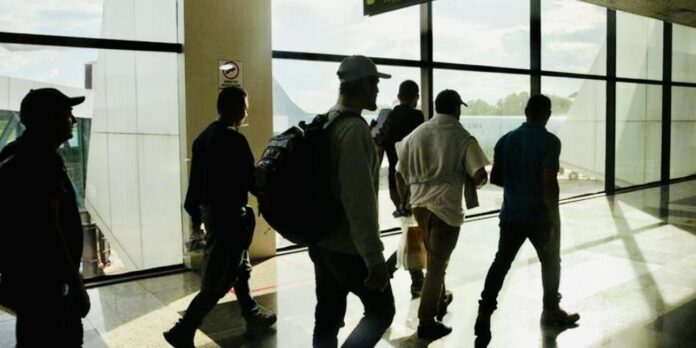Brazil has condemned the United States for what it calls a “blatant disrespect” to the rights of its citizens after 88 Brazilian migrants were deported from the U.S. while being restrained with handcuffs. The incident, which occurred on January 26, 2025, has sparked outrage in Brazil, leading to government intervention.
The flight, initially set to land in Belo Horizonte, in southeastern Brazil’s Minas Gerais state, carried 88 deportees, 16 U.S. security agents, and eight crew members. However, technical problems forced the plane to make an unscheduled stop in Manaus, a city located in the Amazon region. Upon landing, Brazilian officials immediately demanded that the U.S. agents remove the handcuffs from the deportees, a request that was eventually carried out after federal police intervened.
This event comes after a series of contentious deportation practices by the U.S. under President Donald Trump’s administration. Trump has made it a priority to tighten immigration policies, often deporting undocumented migrants in large numbers. The latest incident marked the second time this year that migrants were sent back to Brazil from the U.S., and it was the first deportation of its kind following President Trump’s recent inauguration.
Brazil’s Justice Minister, Ricardo Lewandowski, swiftly ordered federal police to meet the flight in Manaus and oversee the removal of handcuffs from the passengers. Brazilian authorities condemned the practice, calling it a violation of human rights. A prominent government official described the act as a “blatant disrespect” towards the migrants, most of whom were Brazilian citizens.
President Luiz Inácio Lula da Silva, upon hearing about the incident, instructed that the deportees be transported to their final destination on a Brazilian Air Force plane. This move was intended to ensure that the deportees were treated with “dignity and safety.” A statement from the Brazilian Justice Ministry emphasized that the government was committed to safeguarding the rights of its citizens, even in the face of foreign policies that they viewed as unjust.
The controversy surrounding the handcuffing of deported migrants has drawn attention in Brazil, where many view the use of restraints as unnecessary and degrading. Critics argue that the practice undermines the human dignity of those being sent back to their home country, especially since many of the migrants are simply trying to escape poverty or violence in their home countries.
The Brazilian government has been vocal in its criticism of U.S. immigration policies, particularly under the Trump administration. While both countries have long had a relationship when it comes to the deportation of undocumented migrants, the use of handcuffs has been a new point of contention. Brazil has called for a more respectful treatment of its citizens who are sent back from the U.S., stating that their rights should be upheld even if they are being deported.
The incident has sparked debates within Brazil about how to handle its own immigration policies and its stance on deportations. Some argue that the country should be more lenient toward its own citizens who return from abroad, while others call for stronger actions against illegal immigration. Still, the use of forceful measures like handcuffing only adds to the complexities surrounding these issues.
For now, the Brazilian government appears focused on ensuring that the 88 deportees are treated with respect. The airlift to their final destinations was part of the country’s broader effort to ensure that all Brazilian citizens, regardless of their circumstances, are treated with dignity when returning to their home country.
The growing tension over deportations from the U.S. highlights the broader issue of immigration reform, a subject that has become increasingly divisive in both the U.S. and around the world. As governments grapple with the challenges posed by undocumented immigration, the treatment of migrants remains a key issue.
Brazil’s criticism of the U.S. follows a pattern of rising dissatisfaction in Latin America with U.S. immigration policies, particularly regarding the treatment of migrants. While the U.S. has justified its deportations as a way to address illegal immigration and protect its borders, many Latin American governments, including Brazil, view these practices as overly harsh and unjust.
In the coming days, it is expected that the Brazilian government will continue to speak out against U.S. immigration policies, calling for a more humane approach to deportation. Brazil’s intervention in the removal of handcuffs from the deportees is seen as a strong statement of the country’s commitment to protecting its citizens, regardless of their immigration status.
The situation also raises broader questions about the rights of migrants worldwide. In many countries, including the U.S., deportations have become increasingly common, with migrants being returned to their countries of origin under tight security measures. Yet, human rights advocates argue that migrants should not be treated as criminals, particularly when they are often fleeing difficult circumstances such as poverty, violence, or political instability in their home countries.
The deportation of Brazilian citizens from the U.S. has led to increased scrutiny of both nations’ immigration practices. While the Brazilian government’s intervention in this case was aimed at ensuring the safety and dignity of its citizens, it also highlights the ongoing tensions in the global debate over how to handle migration in a fair and humane manner.
As the world continues to grapple with the challenges posed by international migration, the treatment of deported individuals will likely remain a contentious issue. For Brazil, the latest deportation incident serves as a reminder of the need to stand up for the rights of its citizens, even in the face of foreign policies that many consider to be disrespectful and unjust.
In the end, the controversy over the deportation of 88 Brazilians in handcuffs is a reflection of the growing tension between immigration enforcement and human rights. It underscores the complex nature of migration, as well as the ongoing debates about how to best address the issue on a global scale. As Brazil continues to advocate for the rights of its citizens, it also highlights the importance of ensuring that migrants are treated with respect and dignity, regardless of their immigration status.

